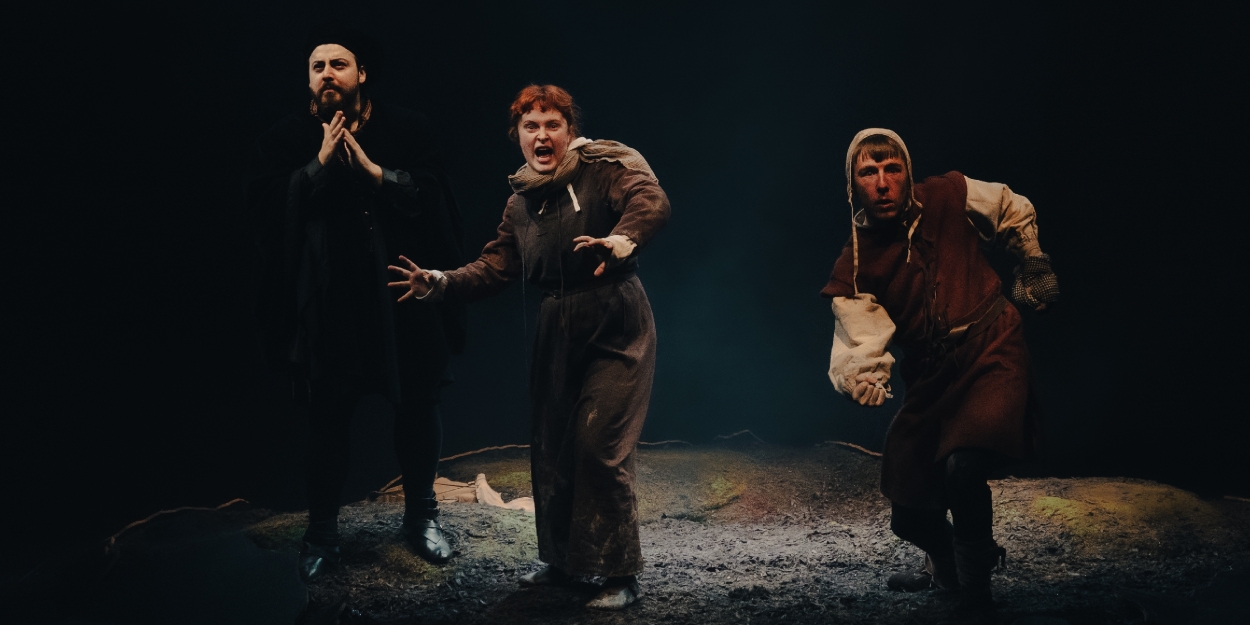Review: THE BOUNDS, Royal Court Theatre
Stewart Pringle's newest play is a feverish examination of a changing society during a match of football's ancestor.

![]() The footie’s doing well on and off stage these days. James Graham’s Dear England continues to be a smash-hit on tour while the boys are trying to bring it home at the UEFA Euro in Germany. The Royal Court presses rewind on the beautiful game, casting our minds back to the very beginnings of the sport.
The footie’s doing well on and off stage these days. James Graham’s Dear England continues to be a smash-hit on tour while the boys are trying to bring it home at the UEFA Euro in Germany. The Royal Court presses rewind on the beautiful game, casting our minds back to the very beginnings of the sport.
Written by Stewart Pringle, The Bounds takes punters to 1553, “the true Golden Age of English football”, when matches could last hours or days and rules were, though relaxed, quite severe. While people are playing in the distance, our protagonists of humble Northumbrian origins end up debating a lot more than football. Rife with superstition and mythology, the piece lives in a limbo.
A slow burner that cautiously grows on you, it takes a while to find its trajectory, only to then lose it again suddenly as it aims to hit a more universal and symbolic point. It may be somewhat messy in its intentions and philosophically knotty, but it remains amusing.
What starts off as a whimsical scene of anachronistic language sprawling with funny insults and modern turns of phrase becomes considerably more obscure and cryptic as the action moves along. Percy and Rowan bicker with solid banter, mischievously placing Pringle’s humour in the same box as the likes of Plebs, Upstart Crow, and Spamalot. It’s all fun and games until they come across a mysterious upperclass stranger whose presence is straight away baffling.

The play then ventures into increasingly more political territory. The problem is that it tries to cover too much at once. There’s talk of witch trials and the growth of the bourgeoisie, but also of religious reformation and Catholic persecution. Percy worries about the changes in his cultural identity while Rowan still bears the marks of his treachery, all the while Samuel weaves his web of deceit. The writing keeps toying with the truth, offering a wobbly reality to the audience while Jack McNamara’s direction amplifies the scepticism instilled in the script by silencing Matthew Tuckey’s semi-constant rumbling sound design whenever poignant kinks untangle.
Static visuals bring on intense dialogue that conceals plenty of allegory and philosophical debate if one wishes to explore that side of the project. It certainly isn’t an immediate production. While the layers of interpretation are dangling there for everyone to grab, they’re not as accessible as the company perhaps believes. What does it all mean? Was it just a character’s nightmare brought on by guilt? Is there more to the final, frankly bonkers yet weirdly resonating, conversation of clairvoyant nature? What does football have to do with anything? We wish we had the answers.

While our understanding of the more Delphic angles of the piece remains shrouded in mystery, the show is rather delectable. Ryan Nolan and Lauren Waine share humorous chemistry as the main pair. Their exchanges are well calibrated in timing and weight to create a balanced atmosphere between the surface silliness and the core examination of a changing society, while Soroosh Lavasani is an enigmatic intruder who drives a wedge between the other two. Brow as arched as his attitude is arch, he’s a steady source of questions. Designer Verity Quinn suspends the trio in the nondescript desolation of a northern field. Wood chips and a few moss-covered boulders emerge from the cracked earth in dark, almost liminal fashion. It works marvels.
As a whole, The Bounds is intellectually ambitious but too murky for its own sake. Ultimately, the play’s effect depends on what one wants to get from it. It’s entertaining and jarring in all the right spots, but some parts probably work more on paper than they do on stage.
The Bounds runs at the Royal Court until 13 July.
Photo credit: Von Fox Promotions
Reader Reviews

Videos
